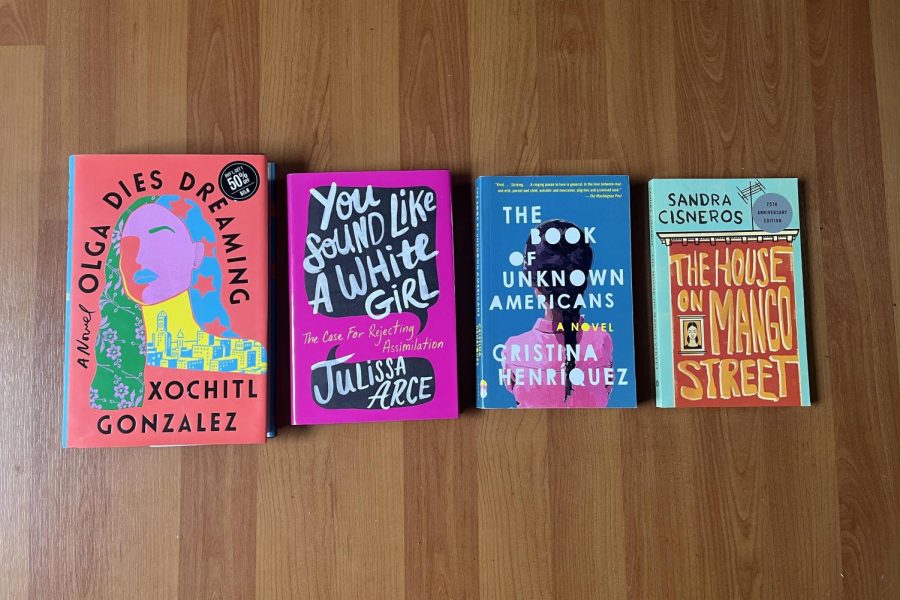Five books written by Latina authors to read right now
Photo credit: Lizette Gonzalez
Four books written by Latina writers are displayed above. In honor of Hispanic Heritage Month, I recommend checking out these books that depict the stories and history of Latines in the United States.
September 24, 2022
I’ve always loved reading. I loved the sensation of flipping through hundreds of pages anticipating what comes next. I love crying and laughing as if I was living the stories I read about. Growing up, I strictly read what was mainstream. But, what was mainstream?: novels written mostly by American or European authors. It was not until I first picked up “I’m Not Your Perfect Mexican Daughter” by Erika Sánchez that I was able to see myself as the main character. I saw my family. I saw my history.
In honor of Hispanic Heritage Month, I collected five books written by Latina writers who have left an impression on me.
“Olga Dies Dreaming” by Xochitl Gonzalez
This book is set during 2017 in New York City and follows the life of siblings Olga and Pedro Acevedo. Olga is a demanding wedding planner, and Pedro is the congressman representing their predominantly Latino, gentrified neighborhood. After learning about the success in their careers, their mother returns to Olga and Pedro’s life to advance a militant political cause in their home of Puerto Rico. Not only does this book dive deep into the realities of the American dream, the struggles of exploring love and poor parenting, but it also touches upon the turbulent history between Puerto Rico and the United States.
“You Sound Like a White Girl” by Julissa Arce
This memoir made me cry three pages in. Mexican-born Arce explains her journey in attempting to assimilate into American culture. Arce writes a powerful manifesto-styled memoir where she tears apart the lie that assimilation brings belonging by examining her own story and the history of Latines in America. What struck me the most was her honesty about the obstacles that continuously delay the progress of Black and Brown communities. I urge everyone to read this book because Arce’s vulnerability is embedded into every page.
“The House on Mango Street” by Sandra Cisneros
In a series of vignettes, Cisneros writes the story of Esperanza, a young girl growing up in a low-income Hispanic barrio in Chicago. Every story is written in a lyrical, majestic tone bringing the beauty and harshness of Esperanza’s story to life. The reader doesn’t only follow the story of Esperanza, but also the stories of her neighbors that ultimately all interconnect. Cisneros beautifully humanizes the experiences that Latines are often shamed about. From Esperanza reflecting on the story of her name to shedding light on the struggles her parents went through to learn English, this book explores themes of self-identity and emphasizes the importance of community.
“The House of the Spirits” by Isabel Allende
It would’ve been impossible to write this piece and not include Isabel Allende in this collection. This book was the first I read by her, and the complex writing intertwined with magical realism mesmerized me. She writes about four generations of a family in postcolonial Chile while addressing the warlike struggle in the country between Marxists and capitalists. The story follows the head family patriarch Esteban Trueba’s passions and secrets. Using magical realism, Allende’s three clairvoyant female characters illustrate the role women had in a patriarchal society and what feminism meant and looked like in this era.
“The Book of Unknown Americans” by Cristina Henríquez
What I love most about this book is the fact that its sole focus is not on the odyssey Latino immigrants embark on when coming to America, but the authentic story of how these characters settle in America. The novel centers around Maribel Rivera, a teenage girl who came to America with her family in search of better medical care for her brain injury. Although the book is centered around Maribel and her prohibited romance with her neighbor Mayor Toro, Henríquez splits the text into chapters offering different points of view. Henríquez represented the voices and stories of immigrants that normally remain in the dark.
Each of these books hold a special place in my heart. Not only because I see fractions of myself within each page, but also because I learned so much about the complexities within different Latine communities. Many of our stories go untold because, as readers, we make them stay hidden within the countless aisles of books. I urge you to pick up one of these books to learn more and enjoy the beautiful literature being written by badass Latina writers.









